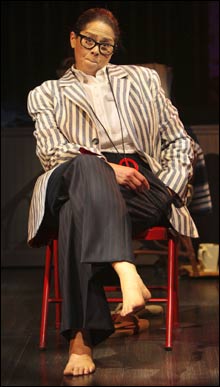
Anna Deavere Smith appears in Let Me Down Easy at the Loeb Drama Center September 12–October 11 |
Anna Deavere Smith is a writer/actor/activist who listens. She builds her award-winning one-woman, multi-character shows by conducting hundreds of interviews, then melding them into one devastating kaleidoscope of the causes and effects of a particular cultural trend or event. (Said events have included the race riots in Crown Heights and Los Angeles.) She seems to inhale the diverse personalities of her interviewees whole, their words, their gestures, their postures, their gut feelings, exhaling them in a collage that is revelatory as both social commentary and human portraiture.After teaching for a decade at Stanford University, Smith left California in 2000 for a dual appointment at New York University’s Tisch School of the Arts and its law school. The accolades for Fires in the Mirror, Twilight: Los Angeles, 1992, and House Arrest have included a MacArthur Fellowship, two Tony nominations, two Obie Awards, 17 honorary degrees, and being shortlisted for the Pulitzer Prize. But she’s probably best known for her role as Michael Douglas’s press secretary in Rob Reiner’s The American President and her subsequent television turn on NBC’s American President–influenced The West Wing. Next year she’ll be seen in Jonathan Demme’s Rachel Getting Married. Here’s what she had to say about her latest one-woman show, Let Me Down Easy, which the American Repertory Theatre is hosting starting next Friday.
Tell us something about this project.
I did the show at Yale, but I’ve changed it. My work always changes until I shut it down, so this is part of the process. I’ve been on a journey; it started in 2000 at the Yale School of Medicine, where I was invited to look at doctor-patient relationships, and I was so fascinated about how the patients spoke to me. I guess when you’re uncomfortable, or have had a bad experience, you want to talk. Basically, for my work in theater, I’m looking for people who want to talk. Now it’s really dealing with mortality, and about how we are with other human beings. I see it as a search for grace in a sometimes distressing world, and in the face of our inevitable mortality. I went to Rwanda to do research 10 years after the genocide; I went to the north of Uganda and talked to child soldiers and sex slaves. I went to South Africa to do research on AIDS, at a time when the president of the country was not acknowledging the disease; I went to the army hospital where they bring the soldiers who have been injured in Iraq. And I went to Katrina and spent time at a cancer center in Houston. It’s been a very long journey. What you won’t see but was in the show in New Haven was that I spent a lot of time talking to people who have no physical problems, who in fact make a living with their bodies: Lance Armstrong, supermodel Veronica Moss, Lauren Hutton, a boxer, a bull rider. The sports people are not in this version. I decided to focus more on spiritual than physical things.

Let us in on the way you work, your process.
For this project, the last time I counted, I had interviewed 320 people. Each interview lasts about an hour. I’ve been doing these interviews since 1970. With House Arrest, I did 534 interviews. All of these projects are under the banner of “On the Road: The Search for American Character.” My book Talk to Me: Travels in Media and Politics is about my process.
House Arrest was about the role of the media in American life. Do you think the media ruined Hillary?
Yes, I do. It’s very hard to see a woman get beat up in public. No matter where you stand, you have to say this moment is so fascinating because it’s bringing us material about ourselves that is both good news and bad news. I think, in terms of Hillary and Obama, it’s an extraordinary opportunity to see the anxiety and fears that the culture still has and the promise the culture has.
Have you any ideas about the American character, after doing so much research into it?
I think the astonishing thing about America, and maybe it’s because I’m African-American, is how much the color has changed. In a brief amount of time, maybe 15 years, we don’t think about black and white. It’s Latinos and Koreans and all kinds of people. When I was a kid in Baltimore, it was all white people and maybe a black cleaning lady, but that’s changed. On the other hand, the gap between rich and poor is huge. I’m very concerned. I hope there’s some innovative public figure or intellectual in our culture who can get that questioned. I don’t think it’s good for us.